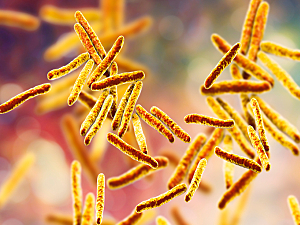A collaborative research team from the Brigham and Women’s Hospital, University of Groningen, and Utrecht University has received an Ammodo Science Award for their groundbreaking research on lipid molecules. Their work aims to develop more reliable diagnostic tests and future vaccines for tuberculosis and other infectious diseases.
The Lipidomics Team is co-led by D. Branch Moody, MD, of the Division of Rheumatology, Immunity and Inflammation at Brigham and Women’s Hospital, Ildiko van Rhijn, PhD, formerly of the Division and now at Utrecht University, and Adriaan Minnaard, PhD, of the University of Groningen.
The Ammodo Science Award for groundbreaking research is given for “jointly conducted research that is internationally recognized, high quality, and potentially groundbreaking.” It is considered one of Europe’s most prestigious scientific awards and includes a stipend of 1,600,000 euros.
Dr. Moody and team have studied the human immune system for years, stepping outside the box to focus on lipids and understand their role in the immune response. Their innovative research has led to many groundbreaking discoveries in the field. For example, while investigating why tuberculosis bacteria survive in the human body, they discovered that these bacteria can suppress immune function by producing unique lipids. These lipids prevent the bacteria from being killed by white blood cells, allowing the bacteria to remain dormant in the body until the immune system is weakened.
They also discovered lipids that are only present in disease-causing bacteria, which has advanced the scientific understanding of tuberculosis infection and provided new targets for diagnosing mycobacterial infections in patients. In addition, they have established a bank of about 100 chemically replicated lipid molecules and made this available to the global research community.
Their research has opened the door to establishing a reliable diagnostic test and effective vaccine for tuberculosis, both of which are in development. For future research, the team plans to set up an innovative program on newly discoverable lipids in the bacteria that cause typhoid fever, blood poisoning, and skin infections.
Read more about the award and the team’s research on Ammodo Science Award.
